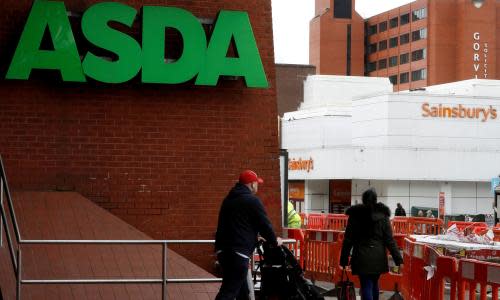Sainsbury's-Asda merger blocked by competition watchdog

The merger between Sainsbury’s and Asda has been torpedoed by Britain’s competition watchdog, which said the £7bn deal threatened to push up prices and reduce the choice and quality of products on sale.
In its final report the Competition and Markets Authority (CMA) said that UK shoppers and motorists would be worse off if Sainsbury’s and Asda – the UK’s second and third-largest supermarkets – were to allowed to merge.
Stuart McIntosh, the chair of the inquiry group, said: “It’s our responsibility to protect the millions of people who shop at Sainsbury’s and Asda every week. Following our in-depth investigation, we have found this deal would lead to increased prices, reduced quality and choice of products, or a poorer shopping experience for all of their UK shoppers.”
Related: Competition watchdog blocks Sainsburys and Asda merger - business live
In a strongly worded statement, the CMA said the merger would create a “substantial lessening of competition at both a national and local level”. This would mean shoppers right across the UK would be affected, not just in the areas where Sainsbury’s and Asda stores overlap, the CMA added.
“We have concluded that there is no effective way of addressing our concerns, other than to block the merger,” McIntosh said.
Analysts had all but written off the deal in February after the damning tone of the CMA’s provisional verdict on the planned merger, which have created Britain’s largest supermarket chain, overtaking Tesco, with annual sales of £51bn.
The ambitious plan to merge Sainsbury’s and the Walmart-owned Asda was unveiled a year ago and sought to create a grocer that would own close to 2,800 supermarkets, convenience stores and petrol stations. Despite its scale – it would also have been the UK’s biggest private-sector employer, with a workforce of 330,000 people – the companies had been confident that competition concerns would be brushed aside, given the rapid growth of the discounters Aldi and Lidl, and Tesco’s 2017 takeover of Booker.
However, the CMA, which since last June has been led by the former Conservative MP Andrew Tyrie, took a dim view, warning the companies back in February that it was minded to block the deal or demand the sale of a significant number of stores or even either the Sainsbury’s or Asda brand – a price deemed too punitive by the merging companies.
Sign up to the daily Business Today email or follow Guardian Business on Twitter at @BusinessDesk
The two supermarkets had promised to cut prices by £1bn if they were allowed to merge but the CMA was unmoved by the promise. The regulator said its detailed analysis of the impact of the deal “clearly showed that, overall, the merger would reduce competition in the market and is more likely to lead to price rises than price cuts”.
The Sainsbury’s boss Mike Coupe, who had promised the deal would give shoppers a 10% cut in the price of popular foods, has previously described the CMA’s analysis as “fundamentally flawed” but has now abandoned any plan to appeal the final decision.
In a statement Sainsbury’s said the two companies had “mutually agreed to terminate the transaction”. But Coupe slammed the decision, arguing the CMA was “effectively taking £1 billion out of customers’ pockets”. “The specific reason for wanting to merge was to lower prices for customers,” he said. “The CMA’s conclusion that we would increase prices post-merger ignores the dynamic and highly competitive nature of the UK grocery market.”
The FTSE 100 company is now eager to move on from the fiasco and will use its annual results next week to map out a growth plan to investors. It is not clear what Walmart will decide to do with its ownership of Asda.
Judith McKenna, the former Asda executive who now heads up Walmart’s international division, said: “While we’re disappointed by the CMA’s final report and conclusions, our focus now is continuing to position Asda as a strong UK retailer delivering for customers. Walmart will ensure Asda has the resources it needs to achieve that.”
The decision to block the deal was supported by the Food and Drink Federation which was concerned that grocery industry suppliers would be squeezed. “Today’s decision is the only logical outcome,” said its chief operating officer, Tim Rycroft. “This proposed merger was a bad deal for consumers and for food and drink manufacturers. Given the evidence provided by FDF members of substantial competition harms, it is hard to see how the CMA could have come to any other decision.”

 Yahoo News
Yahoo News 